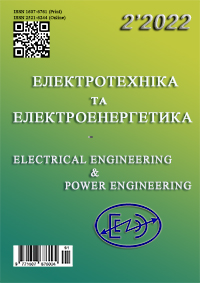Energy saving at energy-intensive enterprises
DOI:
https://doi.org/10.15588/1607-6761-2022-2-6Keywords:
investment portfolio, model Harry Markovic, energy saving, metallurgical enterprises, risk theoryAbstract
Purpose. Investigate the methods of decision-making in the project portfolio management, as well as perform their software implementation as part of the system of the portfolio management optimization of energy saving projects at energy-intensive enterprises.
Methodology. To achieve this goal, Markovitz's portfolio theory was chosen - the theory of financial investment, in which the methods of optimization are the most profitable distribution of the risk of the securities portfolio and income valuation. In combination with portfolio theory, methods were used to find the maximum Sharpe coefficient and minimum volatility according to randomly generated portfolios.
Findings. Methods of portfolio management of energy saving projects are considered through their generalization to the methods of optimization of investment portfolios, but taking into account the specifics of the subject area.
A software application has been developed and tested that automatically downloads data for certain stocks for a certain period from an electronic resource, generates random portfolios and optimizes them by maximizing the Sharpe ratio and minimizing portfolio volatility. Composing a portfolio of investments from four stocks traded on the stock exchange, the return and risk of the portfolio with different types of optimization were calculated. The application implements graphical display of portfolio optimization results in the form of tables and graphs. The first graph shows the changes in each stock over a given period of time. The following is a graph of daily profitability instead of actual prices, where you can see the volatility of shares. The simulated portfolio optimization based on the effective limit is graphically presented - the line along which the points will give the least risk to the target return and the calculated optimization of the portfolio based on the effective limit.
The graphs and tables built by the program allow the user to better assess the created portfolio of the energy saving project.
Originality. The approach proposed in this paper is a combination of methods for optimizing the investment portfolio according to Markovitz's portfolio theory and methods for finding the maximum Sharpe coefficient and minimum volatility in one software application to solve a wide range of problems.
Practical value. The completed development has significant practical value, as it allows you to optimize quickly the financial portfolio for any assets, which allows, among other things, to use the system to optimize the management of portfolios of energy saving projects in energy-intensive enterprises. In addition, it can be the basis or model for a similar development.
References
Kiiko, S. H. (2021) Metodolohi iapredykty vnoiadap-tatsiiupravlinniaport feliamyproiektivenerhozbere-zhen-nianametalurhiinykhpidpryiemstvakh :dys. … d. tekhn. nauk : 05.13.22.Zaporizhzhia, 420.(inUkrainian)
Dubrovin, B.I,. Yuskiv, O.I. (2019) Keruvanniap rotsesamyenerhozberezhe nnianametalurhi-inykhpidpryiemstvakh. VisnykKhersonsko-honatsionalnohotekhnichnohouniversytetu,2(69), p. 2, 61-68.(inUkrainian)
DubrovinV.I., YuskivO.I. (2019) Upravlinniaport fe-liamyproektivenerhozberezhennianametalurhi-inykhpidpryiemstvakh. Radioelektronikai-informatyka, 2, 43-46.(inUkrainian)
Dubrovin, V.I., Yuskiv, O.I. (2019) Strukturainfor-matsiinoite khnolohiiupravlinnia portf eliamypr oek-tivenerhozberezhe nnianametalurhiinykhpidpryiem-stvakhElektrotekhnika ta elektroenerhetyka, 4, 46-55.(inUkrainian)
Dubrovin, V.I.,Yuskiv, O.I. (2019) Enerhozberezhen-nia ta pidvyshche nniaenerhetychnoiefektyvnosti vyrobnytstvanametalurhiinykhpidpryiemstvakh. Novimaterialyitekhnolohiivmetalurhiitamashyno-buduvanni, 1, 93-97.(inUkrainian)
Kiiko S.H., Deineha L.Y., Basanets M.I., Kamiens-kyi D.V., Didenko A.Ie. (2021) Upravlinnia portfeliamy proektivene rhozberezh ennianaosnoviteorii Mar-kovitsa. Intehrovanitekhnolohiitaenerhozbere-zhennia,3, 79-91.(inUkrainian)
Fotis, P., Polemis, M. (2018), Sustainable development, environmental policy and renewable energy use: A dynamic panel data approach. Sustainable Devel-opment, 26(6), 726-740.
Irandoust, M. (2019), On the causality between energy efficiency and technological innovations: Limita-tions and implications. International Journal of Green Energy, 16(15), 1665-1675.
Wiese, F., Baldini, M. (2018), Conceptual model of the industry sector in an energy system model: A case study for Denmark. Journal of Cleaner Production, 203, 427-443.
Akadiri, S.S., Bekun, F., Sarkodie, S.A. (2019), Con-temporaneous interaction between energy consump-tion, economic growth and environmental sustaina-bility in South Africa: What drives what? Science of the Total Environment, 686, 468-475.
De Almeida, A., Fong, J., Brunner, C.U., Werle, R, Van Werkhoven, M. (2019), New technology trends and policy needs in energy efficient motor systems-a major opportunity for energy and carbon savings. Renewable and Sustainable Energy Reviews, 115, 109384.
Lin, B., Wang, M. (2019), Possibilities of decoupling for China’s energy consumption from economic growth: A temporal-spatial analysis. Energy, 185, 951-960.
Trotta, G. (2019), Assessing energy efficiency im-provements, energy dependence, and CO2 emissions in the European union using a decomposition meth-od. Energy Efficiency, 12(7), 1873-1890.
Markowitz Theory of Portfolio Management | Finan-cial Economics [Electronic resource]. – Access mode https://www.economicsdiscussion.net/ portfolio-management/markowitz-theory-of-portfolio-management-financial-economics/29748.
Savchuk V.P. Optymizatsiiafondovohoport-feliu[Electronic resource]. – Access mode:http://www.management.com.ua/finance/fin013.html.(inUkrainian)
Chumachenko M.H. Economic analysis [Electronic resource]. – Access mode: http://ebk.net.ua/Book/BookEkAnaliz/part3.5.html. (inUkrainian)
Yahoo Finance - Stock Market Live, Quotes, Busi-ness & Finance News [Electronic resource]. – Access mode: https://finance.yahoo.com/.
Pandas-datareader [Electronic resource]. – Access mode:https://pandasdatareader.readthedocs.io/en/latest/.
Performance Evaluation of Two Optimal Portfolios by Sharpe's Ratio [Electronic resource]. – Access mode: https://www.researchgate.net/ publication/228671028_Performance_Evaluation_of_Two_Optimal_Portfolios_by_Sharpe's_Ratio.
Downloads
Published
How to Cite
Issue
Section
License
Copyright (c) 2022 Valerii Dubrovin, Larysa Deineha, Valerii Laktionov

This work is licensed under a Creative Commons Attribution 4.0 International License.
Creative Commons Licensing Notifications in the Copyright Notices
Authors who publish with this journal agree to the following terms:
Authors retain copyright and grant the journal right of first publication with the work simultaneously licensed under aCreative Commons Attribution License that allows others to share the work with an acknowledgement of the work's authorship and initial publication in this journal.
Authors are able to enter into separate, additional contractual arrangements for the non-exclusive distribution of the journal's published version of the work (e.g., post it to an institutional repository or publish it in a book), with an acknowledgement of its initial publication in this journal.
Authors are permitted and encouraged to post their work online (e.g., in institutional repositories or on their website) prior to and during the submission process, as it can lead to productive exchanges, as well as earlier and greater citation of published work.

